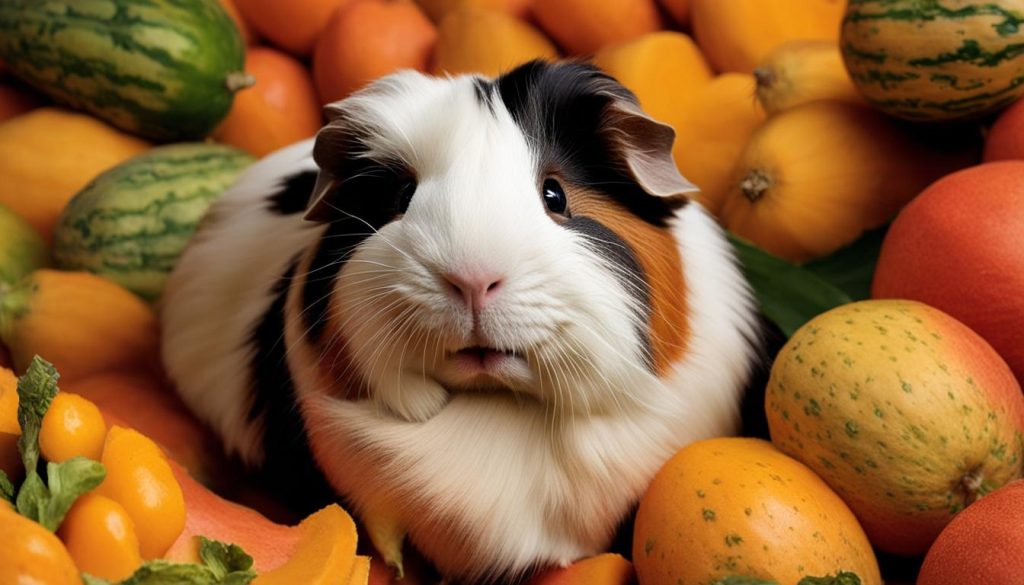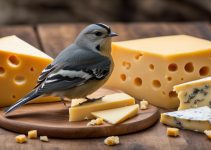Hello and welcome to my guinea pig care blog! Today, I’m here to answer a popular question among guinea pig owners: Can guinea pigs eat cantaloupe? Well, the answer is yes, but there are a few things you should know before you go ahead and feed your furry friend this juicy fruit.
Cantaloupe is not only delicious for humans, but it can also provide some nutritional benefits for guinea pigs. However, it’s important to understand the dos and don’ts of feeding cantaloupe to these small pets.
Can Guinea Pigs Eat Cantaloupe? The simple answer is yes.
- Cantaloupe can be included in a guinea pig’s diet, but in moderation.
- This fruit is rich in vitamin C, potassium, and phosphorus, which are beneficial for guinea pig health.
- However, due to its high sugar content, cantaloupe should be given sparingly to prevent potential health issues.
- Feeding cantaloupe should be part of a balanced diet that includes hay, pellets, and a variety of other fresh fruits and vegetables.
- Consult with a veterinarian for specific dietary recommendations tailored to your guinea pig’s needs.
Nutritional Value of Cantaloupe for Guinea Pigs
Cantaloupe is a nutritious fruit that can provide several health benefits to guinea pigs. It is rich in essential vitamins and minerals that contribute to their overall well-being. One of the key nutrients found in cantaloupe is vitamin C. This vitamin is vital for guinea pigs as they cannot produce it on their own. Vitamin C helps in collagen formation, iron absorption, and supports their immune system.
In addition to vitamin C, cantaloupe also contains other beneficial vitamins such as vitamin A, which is important for maintaining healthy vision, and vitamin K, which aids in blood clotting. It is also a good source of minerals like potassium and phosphorus. Potassium is essential for proper muscle and nerve function, while phosphorus plays a crucial role in energy metabolism.
Vitamins and Minerals in Cantaloupe:
- Vitamin C: Boosts immune system, supports collagen formation, aids in iron absorption.
- Vitamin A: Essential for healthy vision.
- Vitamin K: Aids in blood clotting.
- Potassium: Supports muscle and nerve function.
- Phosphorus: Important for energy metabolism.
Furthermore, cantaloupe contains a high water content and fiber, which can aid in digestion for guinea pigs. The hydration provided by this fruit, along with its natural fiber, promotes healthy digestion and helps prevent issues such as constipation.
Introducing cantaloupe into a guinea pig’s diet, in moderation, can provide them with essential nutrients and variety. However, it’s important to remember that cantaloupe should not be the main food source for guinea pigs. It should be offered as a supplement to their regular diet, which should primarily consist of hay and pellets. Consult with a veterinarian to determine the appropriate serving size and frequency of feeding cantaloupe to your guinea pig.
Including Cantaloupe in a Guinea Pig’s Diet
How to Feed Cantaloupe to Guinea Pigs
When it comes to including cantaloupe in a guinea pig’s diet, it’s important to follow a few guidelines to ensure their health and well-being. First, start by selecting a ripe cantaloupe that is sweet and fragrant. Wash the fruit thoroughly and remove the rind and seeds, as they can be difficult for guinea pigs to digest. Cut the cantaloupe into small, bite-sized pieces, around a one-inch cube, to avoid any choking hazards.
Next, introduce cantaloupe to your guinea pig gradually. Start by offering a small piece and observe their reaction. If they enjoy it and tolerate it well, you can continue to include cantaloupe as an occasional treat in their diet. However, if you notice any signs of stomach upset or diarrhea, discontinue feeding cantaloupe and consult with a veterinarian.
Serving Size and Frequency of Feeding Cantaloupe
When it comes to serving size, it’s important to remember that cantaloupe should be given in moderation. A one-inch cube per serving is sufficient, and it is recommended to offer cantaloupe to your guinea pig up to twice a week. This frequency allows them to enjoy the nutritional benefits of the fruit without consuming excessive amounts of sugar. Remember to include a variety of other fresh fruits and vegetables in their diet to ensure a balanced nutrient intake.

Tips for a Balanced Diet
Including cantaloupe as part of a balanced guinea pig diet is essential for their overall health. Along with hay and pellets, fresh fruits and vegetables play an important role in providing essential nutrients and fiber. Aim to offer a wide variety of fruits and vegetables to ensure your guinea pig receives a diverse range of vitamins and minerals. Remember to consult with a veterinarian to determine the specific dietary needs of your guinea pig based on their age, weight, and overall health.
Safe Fruits for Guinea Pigs
When it comes to adding variety to your guinea pig’s diet, there are several safe fruits that you can include alongside their regular hay and pellets. These guinea pig-friendly fruits not only provide additional nutrients but also make mealtime more exciting for your furry friend.
One of the popular fruits that guinea pigs can eat is apples. They are a great source of fiber and vitamin C, which are essential for their overall health. Another fruit option is bananas, which are rich in potassium and provide a sweet treat for your guinea pig. Berries like strawberries and blueberries are also safe and packed with antioxidants, while kiwi offers vitamin C and dietary fiber. Oranges are another citrus fruit that guinea pigs can enjoy, as they provide vitamin C and a refreshing burst of flavor.
Including fruits in moderation
While it’s tempting to feed your guinea pig an unlimited amount of fruits, it’s important to remember that moderation is key. Fruits, including the ones listed above, should only be given as occasional treats due to their sugar content. Too much sugar can lead to obesity and other health issues in guinea pigs. As a general guideline, offer a small portion of fruit, about the size of a quarter, and no more than two to three times per week.
Introduce new fruits gradually
When introducing new fruits to your guinea pig’s diet, it’s important to do so gradually. Start with small amounts and observe how your guinea pig reacts. If there are no adverse effects, you can continue to incorporate the fruit into their diet. However, if you notice any digestive upset or changes in their behavior, it’s best to discontinue feeding that particular fruit.
Remember, while fruits can provide nutritional benefits, they should never replace the staple diet of hay and pellets. These provide essential nutrients and fiber that guinea pigs need to maintain optimal health. If you have any concerns or questions about your guinea pig’s diet, consult with a veterinarian for personalized recommendations.
Health Benefits and Risks of Feeding Cantaloupe to Guinea Pigs
When it comes to feeding cantaloupe to guinea pigs, there are both health benefits and potential risks to consider. This juicy fruit is rich in vitamin C, which plays a vital role in strengthening the immune system and preventing illnesses. Guinea pigs, like humans, cannot produce their own vitamin C, so it is important to include it in their diet through foods like cantaloupe. This nutrient helps support their overall health and well-being.
However, it is crucial to be cautious with the amount of cantaloupe given to guinea pigs due to its high sugar content. Overfeeding them this fruit can lead to health issues such as obesity, dental problems, and digestive disorders. It is recommended to offer cantaloupe in moderation, as a special treat, rather than a regular part of their diet. A small serving, such as a one-inch cube, up to twice a week can be sufficient to provide the benefits without the risks.
Additionally, guinea pigs have sensitive digestive systems, and abrupt changes in their diet can cause digestive upset. Therefore, it is important to introduce cantaloupe gradually and monitor their response. Observe your guinea pig for any signs of discomfort or changes in bowel movements after consuming cantaloupe. If any adverse reactions occur, it is best to consult with a veterinarian for further guidance.
Guinea Pig Diet Recommendations
When it comes to the health of your guinea pig, a balanced diet is key. Providing the proper food for guinea pigs is essential to ensure they receive all the necessary nutrients for optimal health. Their diet should primarily consist of high-quality hay and guinea pig pellets, which provide essential nutrients and fiber to support their digestion.
In addition to hay and pellets, it is important to supplement their diet with fresh fruits and vegetables. These should be offered in moderation to prevent any digestive issues. Including a variety of fruits and vegetables in their diet ensures they receive a wide range of nutrients. When introducing new foods, it is best to do so gradually, to allow their digestive system to adjust.
Guinea pigs have a specific dietary requirement for vitamin C. They are unable to produce their own vitamin C, so it is important to include foods rich in this nutrient in their diet. Cantaloupe, along with other vitamin C-rich fruits and vegetables, can help meet this requirement. However, it is crucial to monitor the amount of cantaloupe given due to its high sugar content.
What Are the Essential Nutrients for Guinea Pigs?
A balanced diet for guinea pigs should include the following essential nutrients:
Fiber: High-quality hay provides the necessary fiber for guinea pigs’ digestive health. It aids in preventing dental and gastrointestinal issues.
Vitamin C: As mentioned earlier, guinea pigs require vitamin C in their diet. This nutrient is vital for their overall health, including their immune system and collagen production.
Protein: Guinea pigs need protein to support growth, muscle development, and repair. Pellets formulated specifically for guinea pigs are a good source of protein.
Vitamins and minerals: In addition to vitamin C, guinea pigs require other essential vitamins and minerals to thrive. Fruits and vegetables can provide a variety of these nutrients.
Conclusion
Feeding cantaloupe to guinea pigs can be a healthy addition to their diet when done in moderation. Cantaloupe offers important nutrients such as vitamin C, potassium, and phosphorus, which contribute to their overall well-being. However, it is crucial to remember that guinea pigs should not rely solely on cantaloupe or any other fruit for their nutritional needs.
A balanced diet for guinea pigs consists of hay and pellets as the main staples, with fresh fruits and vegetables as supplements. Cantaloupe should be served sparingly, about once or twice a week, in small portions. It is also essential to monitor their sugar intake and ensure they consume a variety of foods to maintain a well-rounded nutrient intake.
Consulting with a veterinarian is always recommended to obtain personalized dietary recommendations for your guinea pig. They can provide guidance on proper portion sizes and frequency of feeding cantaloupe. By following these recommendations, you can ensure that your furry friend enjoys the nutritional benefits of cantaloupe without compromising their health.
FAQ
Can guinea pigs eat cantaloupe?
Yes, guinea pigs can eat cantaloupe in moderation.
What are the benefits of feeding cantaloupe to guinea pigs?
Cantaloupe is rich in vitamin C, which helps with collagen formation and boosts the immune system. It also provides potassium and phosphorus, which are essential for muscle and nerve function and energy metabolism.
How often should I feed cantaloupe to my guinea pig?
It is recommended to feed them a small serving of ripe cantaloupe, around a one-inch cube, up to twice a week.
Are there any other safe fruits for guinea pigs?
Yes, other safe fruits for guinea pigs include apples, bananas, berries, kiwi, and oranges.
What are the health benefits of cantaloupe for guinea pigs?
Cantaloupe provides essential nutrients like vitamin C, which strengthens the immune system and prevents illnesses in guinea pigs.
Are there any risks of feeding cantaloupe to guinea pigs?
Yes, cantaloupe has a high sugar content, so it should be given sparingly to prevent health issues like obesity.
What should a guinea pig’s diet consist of?
A guinea pig’s diet should primarily consist of hay and pellets, with fresh fruits and vegetables offered as supplements.






